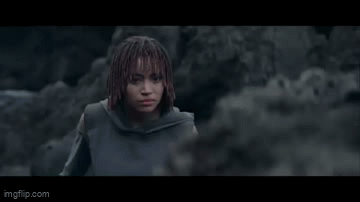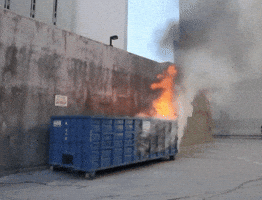When someone interviews Headland & co. - and apparently Headland did/had some writing ability - SOME - at least in the past - nobody seems to bluntly point out to her the obvious writing/editing issues, as well as casting issues, directing issues.
I'd assess Headland as just a tick above industry average for a writer. Everyone else, of course, can feel differently on that one. Most of my gauge on that is from Russian Doll. So based on that, as most people here are not likely to have seen it, I might have had the fortune, or possibly misfortune, to get a feel of what Headland tends to do and where she tends to go.
For transparency, I consider The Acolyte as one of the most misogynistic stories put on any kind of film in the last decade. I suspect, based on statements Headland made in interviews and the general tone enforced by The Big Mouse, that many see it the opposite way. That Acolyte is more misandrist in nature. And I can see where those people are coming from, but I just disagree. Headland is absolutely brutal in Russian Doll to her female characters. But some of it is relatively subtle in nature. No matter what she says in public and no matter what she does in her personal life, I won't ever assess as some kind of wild eyed activist feminist in the industry. She's a mercenary. And she'll shift to whatever stance will best move her forward. She has a talent for survival.
If you change Diablo Cody's Juno into the perspective of JK Simmons, the father, the film takes an entirely different direction. Juno seems like a mostly soft serve coming of age story for a rebellious teen who mostly means well. The stakes are never accelerated past comfortable suburbia, geared for a very sedate mostly casual audience. But I'd assess there are actually some complex layers beneath it. Performer E. Page ( formerly Ellen Page and now Elliot Page) really brings very little to the table to the role. Page looks the part. Page is actually a relatively increasingly mediocre performer as the material gets progressively stronger. Which is the typically the reverse of what normally happens. But Page is buoyed by a pretty sharp script and real talents like JK Simmons and Allison Janney.
From Juno's position ( I'm going to follow the "character" now, not the real life performer) , she meets Jennifer Garner's character, and she's laying it straight. Bold and blunt. From the the father's perspective, Garner's character sees them as useful white trash. From Juno's position, she tells her parents about her pregnancy, and it's supposed to be witty and whimsical. From the father's perspective, he recognizes what is likely her mother in her ( Janney plays the step mother) and that he failed at some level, but also Juno's nature is untrustworthy. From Juno's position, as the walls close in on her at the end of the film, she comes to her father, in almost desperation, wanting to find some semblance of hope out of this entire mess. The casual audience, seeing it from Juno's POV, will see a kind supportive dad much in the mold of a John Hughes film. However from the father's perspective, he's telling her to settle for Michael Cera's character ( someone he's openly gauged as a total non entity and disappointment) , but wraps it in frosting because Juno can never go back to what she was before. Not in their town, not in her relationship with him, not with her clear disposition for self inflicted chaos.
Cody had a write a script not just for the perspective of the pregnant teenager. But also for the commonly beleaguered and ambushed "grandparents" who are stuck picking up the real logistical pieces left behind. It's a coming of age story for Juno, from her viewpoint, but it's validation to the father that his daughter is pretty much a naïve moron who is going to likely suffer through life learning everything the hardest way possible. And he'll be stuck as her only real safety net.
If you shift the POV from each character, from Page to Garner to Ozark Bateman to JK Simmons to Janney, there are different layers to the various principle archetypes into these kind of situations.
My take is don't fight what Headland is doing when the POV changes. The "Force Is Female" and the fruit that came to bear was a total massacre of the Jedi. The relationship with Sol and the twins once you shift the POV is that there is no point in helping little girls, because they grow up, they encapsulate that the "Force Is Female", and as the results show again and again, everyone gets massacred.
I don't see the witch "coven" as subversive at all. I don't see it crushing established lore. I see it explaining the pathology of a future massacre to come. With JK Simmons in Juno, what's quite interesting and unique is he doesn't fight any of it all. He understands he can't feel away the trajectory of chaos inflicted on his life. There are several points where he quietly, but doesn't hide that he accepts his daughter Juno is a moron. Not evil. Not manipulative. Not a sociopath. But just a plain stock and trade moron. Had Sol just accepted that with the twins, he'd still be alive. And maybe all those future generations of Jedi would still be alive too.
Because of the current culture driven in the modern film and television, the expectation is that a strong heavy theme of misogyny in the narrative would be very open and transparent. No, IMHO, thin slivers and hints of it are surface level. The real brutal usage of something like misogyny as a core template in the writing is often very benign looking to start. The most vicious kind can sit next to you casually and almost trick you into thinking it's comforting.
Real malice hides in plain sight. Want proof? Consider all the people you've known in your entire life, who would never speak to some of their family members at all if they were not related. The unspoken tension between relatives who understand that if they didn't share blood, they'd probably be enemies or ignore each other in relieved silence. Keeping changing your perspective to different characters to proxy them as the main POV and The Acolyte IMHO takes a much different turn.







